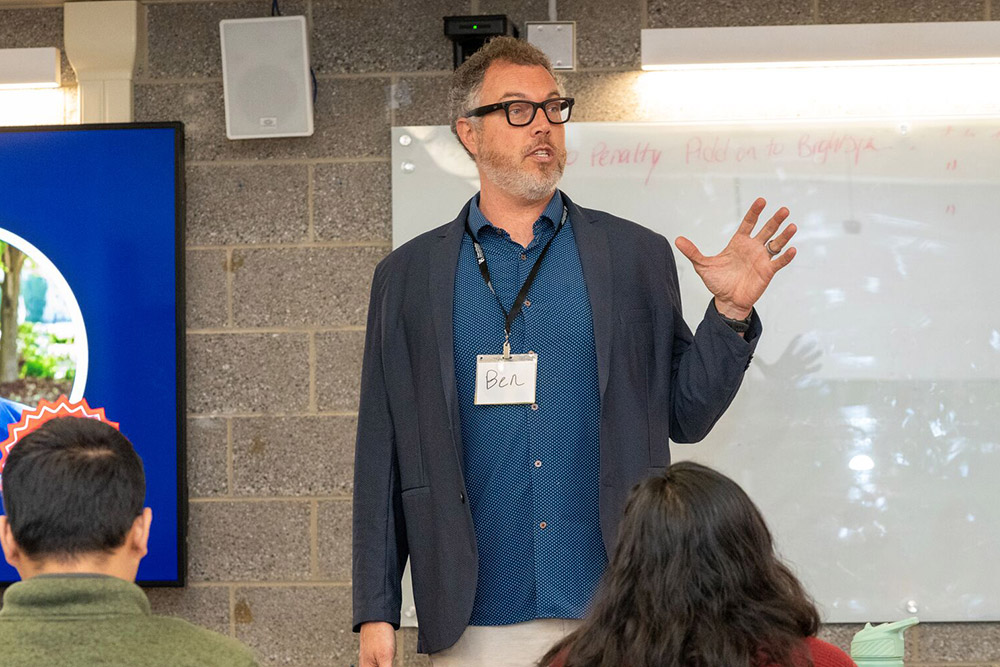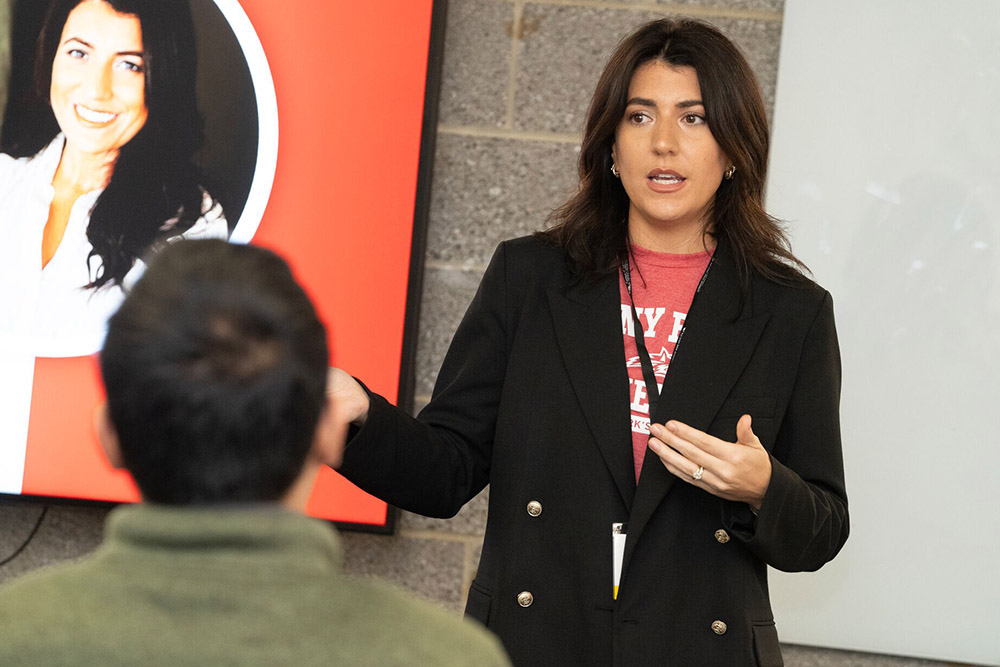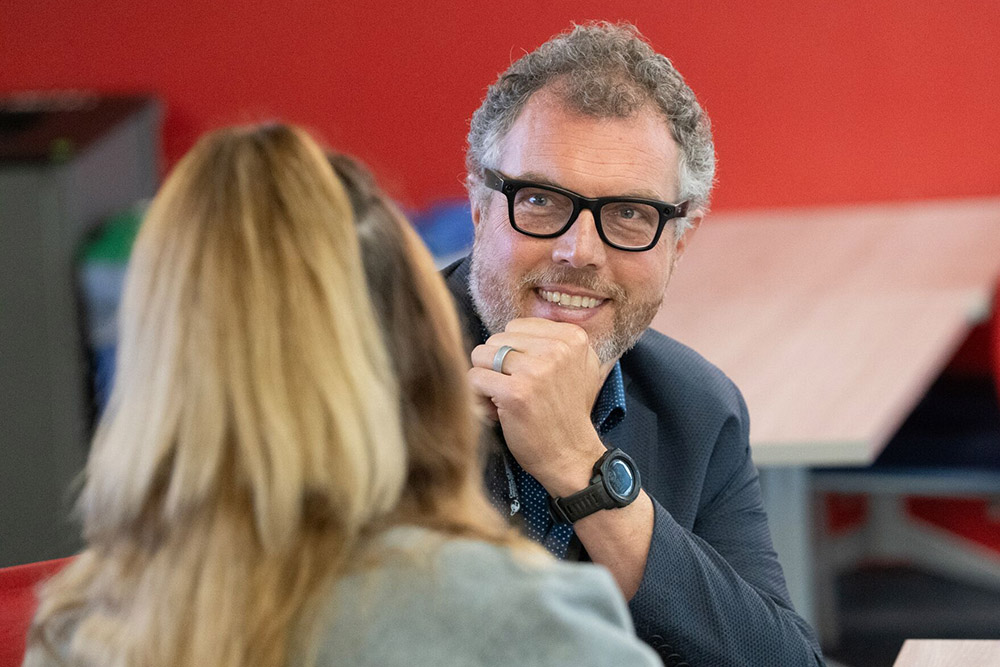Students Unlock Entrepreneurial Mindsets at ‘Disrupt the Brook’

Photos by John Griffin.
Stony Brook University launched Disrupt the Brook, an event aimed at helping the nearly 40 student attendees unlock their entrepreneurial potential with a goal of building an inclusive innovation ecosystem from the ground up.
Held May 9, the session was the first step in an initiative led by the Office for Research and Innovation to bring startup thinking into campus culture. The office recently launched the Student Entrepreneurship and Innovation area to strengthen support
for entrepreneurial initiatives and foster a vibrant culture of innovation among undergraduate
and graduate students.
“The creation of the Student Entrepreneurship and Innovation area marks an exciting
step forward in our commitment to cultivating a culture of innovation across campus,”
said Kevin Gardner, vice president for research and innovation. By empowering our
undergraduate and graduate students with the tools, mentorship, and resources they
need to turn ideas into impact, we are investing in the next generation of entrepreneurs
and changemakers.”
The event was facilitated by Ben Reno-Weber, social and civic entrepreneur and chief innovation officer of Essential Innovations. Reno-Weber shared insights rooted in the Lean Startup methodology — a system that emphasizes rapid experimentation, customer feedback, and continuous iteration and improvement.
Reno-Weber said Lean Startup “has gained a lot of freedoms, and there’s lots of iterations and criticisms, but the central premise is the most important thing you can do if you are starting your business is listen to your customer, test something and then fix it and test it again, and you basically never stop doing that.”
That message echoed throughout the day, aligning with the vision of Hannah Estes, director for student entrepreneurship and innovation at Stony Brook and the organizer of the event. “When I came to Stony Brook in January, I realized that we didn’t have an innovation infrastructure yet,” said Estes. “We have so many amazing resources around Stony Brook, but a lot of students, faculty and staff have no clue how to utilize them. My first thought was that I need to start with the students, because the students are the heartbeat of an institution.”

Disrupt the Brook was conceived as a “beta launch” of what Estes hopes will evolve into a robust innovation ecosystem, one that’s inclusive, interdisciplinary, and deeply connected to student creativity. “Right now, if they have an idea — any type of idea — they can come to me or our research and innovation team. No idea is too silly or too small,” Estes said. “This is going to be for all students. I want to see art majors show up. I want to see people in education, social work… all different types of backgrounds. Those are the unique perspectives we need.”
Throughout the workshop, students were encouraged to reflect on what they personally need to get started and to recognize that those needs might look different for everyone.
“What I need to start something is different from what you need,” Reno-Weber emphasized. “This is our opportunity to really give that meaningful input. This is our moment to really elevate the things that we actually want.”
That approach resonated with students like Swaraj Pradhan, a freshman physics major with lots of ideas. “A lot of these ideas stay as ideas, and I’d love to make them into products or businesses,” said Pradhan. “There’s kind of a gap there when it comes to the process of actually doing that, and I’d love to learn about that.”
For sophomore sociology major and pre-medical student Russell Erfan, the experience was just as energizing. “I have a bunch of ideas that I want to work on,” he said, “but I gravitate towards groups of people that are energetic and passionate about things. I like to just talk to people that get excited about those things, like the group here today.”
Erfan said the workshop not only reignited his motivation but also revealed new paths forward. “I also learned more practically that there are a lot more resources than I might have imagined with regard to entrepreneurship,” he added. “They recommended I go into an accelerator. Seeing all those resources and the long list of things available to us at Stony Brook, I think I’ll just contact everybody. It’s just been really great with networking.”

That spirit of exploration also resonated with Jon Longtin, professor and interim chair of the Department of Mechanical Engineering, who joined the event to share lessons from his own entrepreneurial journey. “We built this beautiful technology, which turned out to work really well, and we decided to start a company, which we did,” Longtin said. “We raised $30 million in undiluted capital… but the colossal mistake we made is we built this beautiful technology and assumed the people would come.”
Longtin emphasized that even world-changing ideas require validation through customer discovery, something he’s now applying as he helps build a new medical device accelerator at Stony Brook. “We’re going to compare every idea against three gates: is the IP space clear, is it technically feasible, and is there really a demand for this?” he explained. “That’s the hard part, because you have to go out, put your sneakers on, and really ask hard questions.”
Daniela Benitez, operations associate for Counseling and Psychological Services (CAPS) and a student in the combined MPH/MBA program, found support and networking for her percolating ideas by attending the event. “The most valuable thing today has been the connections, the different thinking that there seems to be in the room,” she said. “Just being inspired by other students or leaders who are doing this event, and just knowing that there is more support than I originally came here thinking there was. And the support aligns with what I believe in and who I am, I think that’s really key.”
In the spirit of entrepreneurial experimentation, attendees were prompted to identify real problems and workshop potential solutions.
“Entrepreneurship starts with, ‘I’ve got a problem,’” said Reno-Weber. “The reason we did that as our icebreaker is to identify the thing that you may be struggling with, and to create solutions for that problem. Being an entrepreneur, someone is going to tell you your baby is ugly. Be receptive to criticism and feedback, be resilient, and be resourceful.”
